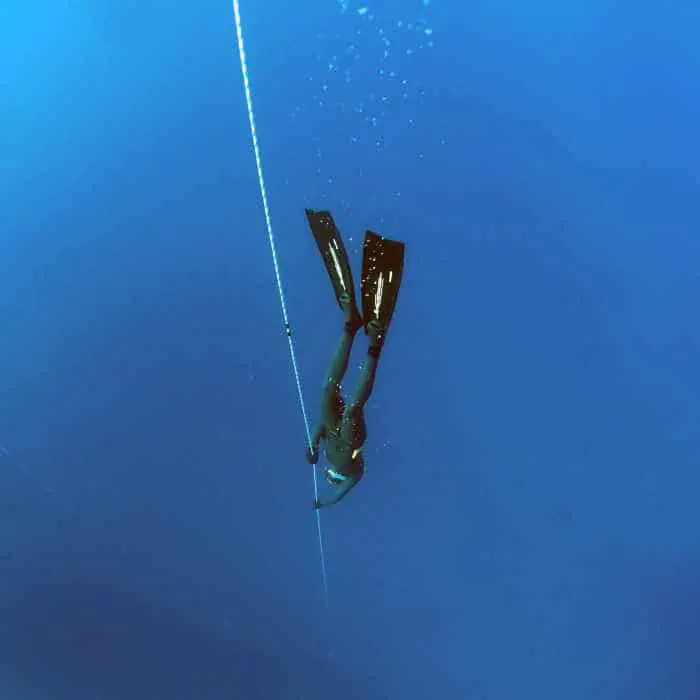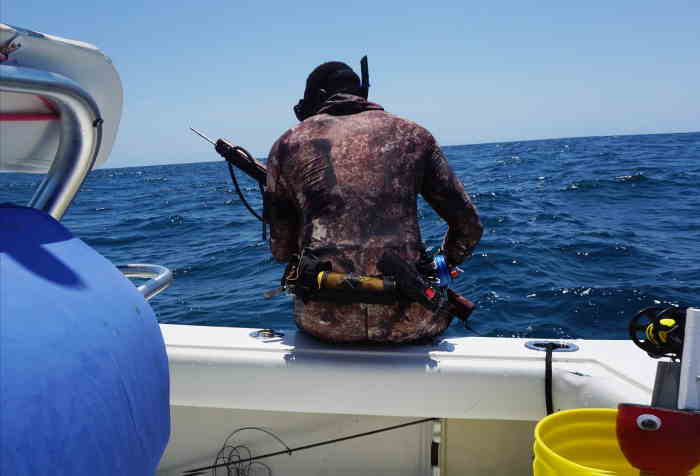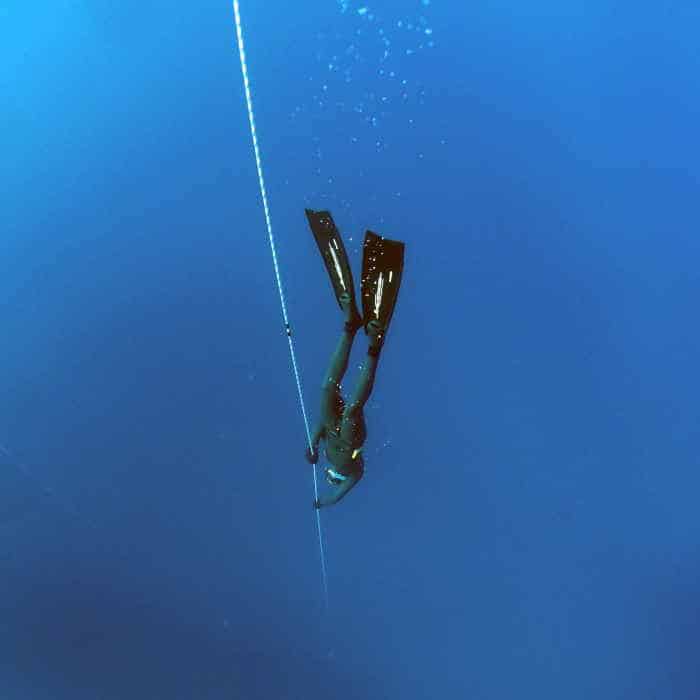- You are here:
- Home »
- Blog »
- Gear Guide »
- Freediving With Earplugs: Why Choosing the right type is critical
Freediving With Earplugs: Why Choosing the right type is critical


Freediving can be a thrilling and exhilarating experience without the burden of wearing cumbersome breathing apparatuses and spending money on expensive equipment. But you may feel some discomfort inside your ear canal when diving. Earplugs seem like an excellent solution to the problem, but can you wear them while freediving?
[Medical disclaimer: This post is not medical advice nor is the writer a qualified medical practitioner. It’s recommended to consult a licenced physician if you have concerns about diving with earplugs.]
You can wear earplugs when freediving, but it depends on the type you are using. Freediving earplugs are specially designed to counter the pressure buildup in your ears due to your descent into the water. They can also help prevent infection by keeping out parasitic invaders.
In this article, I’ll look at how freediving can affect your ears and why earplugs can help. You’ll also learn the pros and cons of diving with it, the specific brands of freediving earplugs and what to look for when purchasing.
Effects of Freediving on Your Ears
Freediving falls into several different categories depending on the activity involved. These include:
- Freediving because you are spearfishing, professionally or recreationally.
- Playing an underwater sport such as football or hockey.
- You might perform competitively in synchronized swimming.
No matter the reason why you’re freediving, it’s essential to pay attention to equalizing your ears.
What Is Equalization For Ears?
Equalization refers to the pressure felt in your ears when you are descending underwater. You can feel this same sensation when reaching high elevations, like on an airplane or if you have a sinus infection.
You’ll feel the need for your ears to “pop” to relieve the pressure, which can be achieved by actions such as chewing gum, yawning, or moving your jaw around.
Equalization Techniques While Freediving
In freediving, equalization can be reached by a few different techniques.
For example, when descending, you can pinch your nose and blow out through your nose to relieve ear pressure. Or you can try the Frenzel Maneuver, which includes specific movements with the tongue that act to block the back of the throat and nasal passages.
You can also wear freediving earplugs that will help to relieve discomfort and aid in equalizing your ears.
Possible Ear Infections While Freediving Or Surfing
Freediving and being in the water regularly could also lead to a potential ear infection, such as Swimmer’s Ear or Surfer’s Ear. Swimmer’s Ear occurs when water becomes trapped in the ear canal, which over time, creates an environment for bacteria to grow inside the ear, and thus infection occurs.
Surfer’s Ear occurs due to prolonged exposure of water in the ears over some time, creating extra bone growth over the ear canal and will need surgery for removal of the extra growth.
Although it is named Surfer’s Ear, this condition can occur in someone that participates in most aquatic sports, including diving. Freediving earplugs may help to prevent such infections as Swimmer’s Ear or Surfer’s Ear.
Wear Earplugs Designed For Freediving
If you plan on wearing earplugs when freediving, you need to make sure they are specifically designed for that purpose.
Noise-canceling earplugs and freediving earplugs are not the same, as the latter is designed to be vented to aid in equalization. Freediving earplugs are designed to help decrease the space inside your ear that needs to be equalized but don’t necessarily block out all water.
Things To Remember While Freediving With Ear Plugs
Although earplugs can be helpful to wear when freediving, there are some things that you need to remember if you choose to use them. Let’s take a closer look at these factors.
You Must Have the Correct Type of Earplugs
The earplugs you wear to cancel out noise or to keep water out are not the same as freediving earplugs.
These earplugs close off the ear canal entirely, which can be helpful if there are loud noises you want to block out. Or, if you want to go swimming but have surgically placed tubes in your ears that you don’t want to be exposed to water, then it will be helpful to use regular earplugs.
If you plan on freediving with earplugs, you need to make sure they are specifically designed for that purpose.
Freediving earplugs are vented to allow some water into your outer ear canal. The middle and inner ear canal is closed off from water intake. This design will help with the equalization process and aid in lessening discomfort while underwater.
Using Earplugs That Are the Right Size Is Essential
Just like you wouldn’t buy shoes that are too big for you, you shouldn’t buy earplugs that will not fit inside your ear. You can risk the possibility of the earplugs falling out, or you could lose them. To find the right size for you, the easiest way is to purchase a sizing kit, especially if you plan to purchase them online.
This will help you to try different sizes out and see which is the best fit for you.
Your earplug should sit snugly inside your ear. Freediving earplug sizes can range from child to XL, so no matter how big or small your ears might be, there will be earplugs that will fit you.

Freediving With Ear Plugs: Pros & Cons
Let’s take a look at the pros and cons of freediving with earplugs. Before you go in the water, you want to know you’re doing the right thing for your ears.
Pros Of Freediving With Earplugs
- Earplugs that are worn while freediving can help to prevent discomfort and infection. By limiting the amount and depth of water that enters the ear canal, earplugs may put a stop to any possible infections such as Surfer’s Ear or Swimmer’s Ear from forming.
- They can help with equalization. By allowing an air cushion for water to enter partly into the ear, earplugs will help to balance the pressure in your ears while freediving and lessen the pain and discomfort you would feel when descending.
- They don’t block out sound. Unlike traditional earplugs, you will still be able to hear normally when wearing your freediving earplugs, which will come in handy if your diving partner is trying to communicate with you about potential risks or just trying to get your attention.
Cons Of Freediving With Earplugs
- Ears plugs aren’t a complete solution to equalization. Although freediving earplugs help with equalization, they may not fully complete the job. You may have to try other methods to achieve full equalization.
- There’s a risk of your earplugs falling out while freediving. Swimming and quick movements underwater may shake your earplugs loose and knock them out of your ears. This is why it is very important to make sure you choose earplugs that are well-fitted to the size and shape of your inner ear.
Earplug Brands for Freediving
If you’re looking for the best earplug brands for freediving, we’ve got you covered. Both of these brands are available on Amazon.com and will work well while you’re freediving.
Docs Pro Plugs: These are advertised as “The Ultimate in Ear Protection,” and are designed to form to the shape of your ear canal when warmed by body temperature. Recommended by doctors and reasonably priced, Docs Pro Plugs are a great choice for freediving.
SurfEars: Don’t let the name fool you. Although designed with surfers in mind, SurfEars work well for diving and freediving as well. Testimonials from divers will demonstrate the durability and top-quality of these earplugs.
Conclusion
Now that you’ve been introduced to the way your ears can be affected and why earplugs can be helpful in freediving, it’s now your turn to make the decision that’s right for you.
If you feel that wearing earplugs while freediving is right for you, pick up a pair for your next excursion. If you don’t think they’re necessary for your needs, then continue on with your freediving adventures.
It’s up to you and your level of comfort. Just remember, freediving can be a potentially risky sport, and you should always take precautions to ensure a safe experience.
About the Author Gerrie van Niekerk - Apnealogy
Gerrie is a passionate Freediver, Spearfisher, Digital Marketer, and author for the Apnealogy website. Gerrie is an SSI Level 1 certified Freediver who loves geeking out about freediving and spearfishing gear and lives for his family and adventure.


